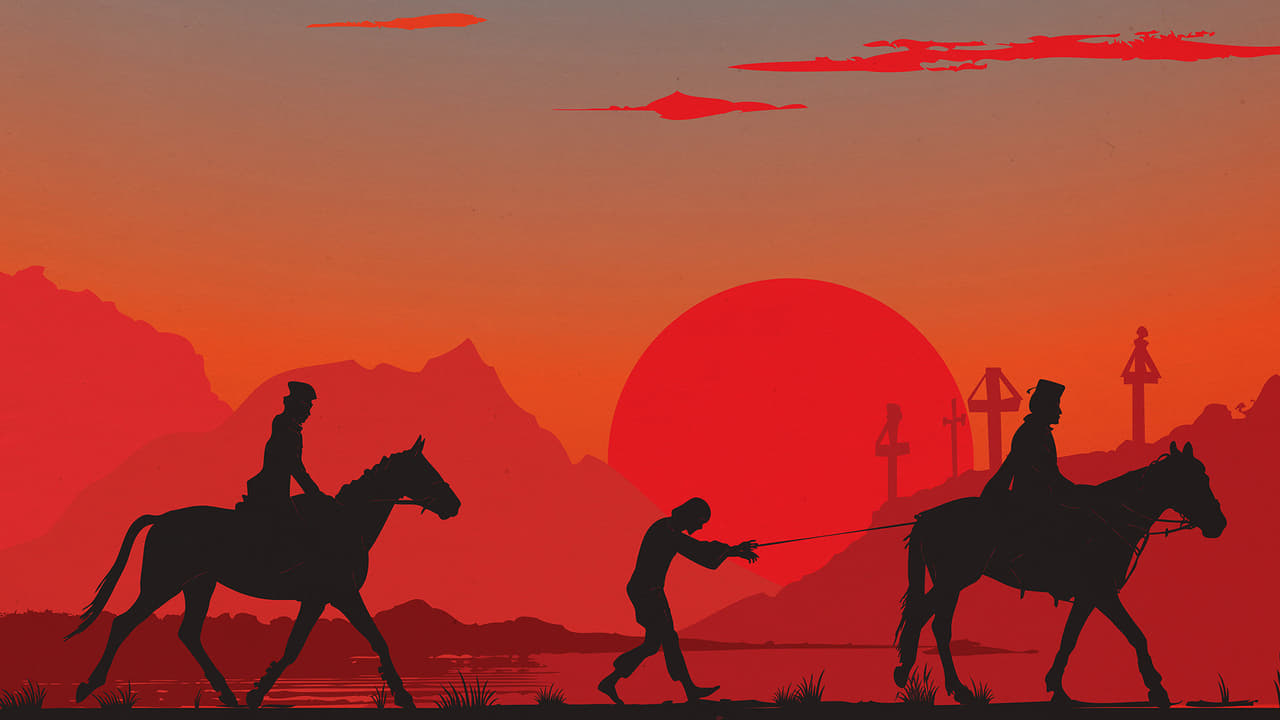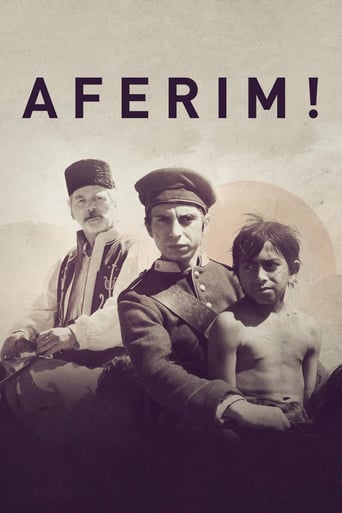Hellen
I like the storyline of this show,it attract me so much
Redwarmin
This movie is the proof that the world is becoming a sick and dumb place
Mandeep Tyson
The acting in this movie is really good.
Marva-nova
Amazing worth wacthing. So good. Biased but well made with many good points.
CinemaClown
Why the hell is this film in black n white? I don't have any issue with greyscale photography but from the looks of it, Aferim! appears as if a colourless filter was applied to it without any consideration of how to make it look better for the little enhancements that could've turned its images more expressive & attractive are sorely missing.Set in Wallachia in the early 19th century, the story of Aferim! concerns a local policeman & his son who are hired by an Iordache to track down & retrieve one of his slaves who had run away from his estate after having an affair with his wife. The plot follows the journey of this father & son duo during which the former tries to impart some wisdom to the latter.Co-written & directed by Radu Jude, Aferim! addresses the Roma slavery and covers all the absurdities of religion & caste system that only discriminates one from another. Although its subject matter is harsh & affecting, the fine use of wit in conversations between the father & son keep the experience lighthearted for the most part but its final act turns out to be more disturbing than expected.It's quite evident from the background that the locations are beautiful to look at but it would have looked far more appealing if the entire movie was filmed in colour for its black-n-white camera-work only ends up seeping the life out of those images, thus rendering it colourless both literally & figuratively. Performances are quite good, Editing however is lethargic & it's a pain to sit through if the conversations don't work out for you.On an overall scale, Aferim! is driven by its heavily-worded screenplay, brilliant contribution from its leading duo, and its discomforting depiction of a shameful era in Romanian history. Dressed as a western, the film will manage to keep the viewers' interest alive solely on how they react to the father-son conversation which virtually goes on from start to finish. A very strange mix of brutality & hilarity, Aferim! was good for me only during the final 15 minutes.
dromasca
What critics and audiences call 'the Romanian New Wave' is not that new any longer. Already in its teens it has focused on the present times, and the recent past of Romania - the last decade of the Communist era and the 'transition' period the country went through after the fall of the Communism. By doing so it neglected a tradition built into the history of the Romanian cinema - the historic movies. The first grand Romanian movie made more than a century ago was already a historic film, bringing back to screen the War of Independence of Romania in 1877 several decades after the event. The genre was taken over and polluted in the Communist period by many films which not only brought on screen heroic episodes and heroes of the Romanian history but also distorted it on the lines of the National-Communist propaganda of the regime. This may be the reason Romanian directors, producers, and audiences as well avoided the genre for a while. It is only in the last few years that historical themes came back to screens in more significant movies - the war period and the Holocaust first. Now 'Aferim!' by Radu Jude goes further back in the past, to the first half of the 19th century. His film (blessed with an important prize at the Berlin Festival early this year) however has also strong and explicit implications in the realities of today's Romania as well.Folks who know the history of Romanian cinema and remember some of the films made decades back will recognize elements of atmosphere and quotes. The 'Eastern' genre which took the structure of the classical American Westerns bringing on screen local characters or even changing the landscape to the fields, forests and mountains of the Romanian countries was popular in the 70s with the 'Haidouk' series but also in the works of Dan Pita (the 'Ardelenii' series). The inspired black and white cinematography credited to Marius Panduru and the very conventional generic that opens the film brought in mind the even older 'Tudor' by Lucian Bratu made in 1962 which dealt with events that took place 14 years before the year 1835 when 'Aferim!' is situated. The violently naturalistic nature of some of the scenes has also its roots in the Romanian literature (Liviu Rebreanu's novels) which were also brought to screen.Yet, this film aims more. The story of the local sheriff (let us use this name for the sake of the international audience) and of his son searching for a fugitive gypsy in the forest and swamps of Wallachia is not just a road movie or an initiation story from the perspective of the young lad destined to inherit the profession of his father. It is a deep and cruel reflection of the prevailing attitude not only of the ruling class but of the whole or great majority of the population of Romania towards other nationalities. The story and the characters come in a frontal manner against deeply rooted stereotypes like the welcoming attitude of Romanians towards strangers or the positive role of the Orthodox church in the moral fiber and education of the masses. It is actually a priest who speaks on screen a tirade full of prejudice against all categories of strangers living or getting in contact with the Romanian at that time - Gypsies of course, but also Jews, Turks, Russians, etc. Folks less familiar with the history of Romania should know that by 1835 Romania was still broken into smaller countries under Turkish, Austrian and Russian rulers - so what is seen on screen has a historical perspective. It is however the relation with the present that comes in mind immediately for those who know history and present. Romania as other East European countries have a big social and ethnic problem with the lack of integration of part of their Roma (gypsy) minorities. The roots of this situation lay to a great extent to the slavery practiced on this minority until mid 19th century. Slavery was abolished (in 1855-1856) but prejudices stay.The merit of Radu Jude is to avoid any excuse or sweetening of the historical facts, while telling a coherent story and creating characters who are not only credible but also memorable. He carefully builds the atmosphere, habits, language of the time in a well documented manner. He is helped by a fine team of actors - Teodor Corban and Mihai Comanoiu as the father and son, Toma Cuzin as the fugitive (would have deserved maybe more screen time to give more complexity to his character), and Alexandru Dabija as the cruel but credible landlord. Two of the best actors of Romania from the older generation Victor Rebengiuc and Luminita Gheorghiu appear in short roles, which shows that even important artists were interested to be part of this cinematographic experience. I feel that 'Aferim!' is a film that was much talked about since its release, and will be even more talked about in the future.
Kirpianuscus
an old story. about a society and its people, traditions and every day life. a film who reminds a world who has only reflection for a lost age. same brutal language like many Romanian films after 1989, the same desire for appreciation, using dark clichés. . but a special message. like a testimony, a kind of parable, as a bitter story about life, world, destiny, justice and faith. Radu Jude does an good work.with a profound commercial purpose. but he explores the profound manner to discover/define an universe who describes the habits of present Romania. so, a gray movie , decent performances, nice script - puzzle of old writings, songs ,careful documentation, delicate traces from Bergman, trip in heart of a circle who remains frame from Balkans. a film who could be a deep subjective history lesson. in fact, only support for reflection. about the roots of present.
Armand
an useful film. for understand the roots of modern Romania. a beautiful one. for archaic language's flavor, for the nuances of emotions, for the powerful clichés who defines the Walachian society not only in the year 1835. a seductive film. for the good performances, for the crumbs from great films, for the art to broke the limits between artistic film and documentary. an interesting film. for the science to reflect a period's deep lines of life. for humanity and for the grace of details. for the art not to remand but recreate not only a portrait but a state . for dialogs and for the values. for something who reflects the profound Romania behind the definitions or verdicts. Teodor Corban does an admirable job and Radu Jude becomes more than a promise for Romanian cinema. because, for the foreign public Aferim ! could be a slice of exotic world from Balkans in the XIX century. for the Romanians it represents chain of answers for a lot of questions. and, maybe, an exercise of honesty.

